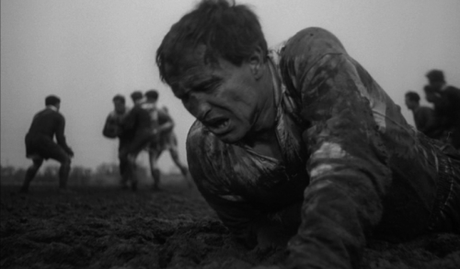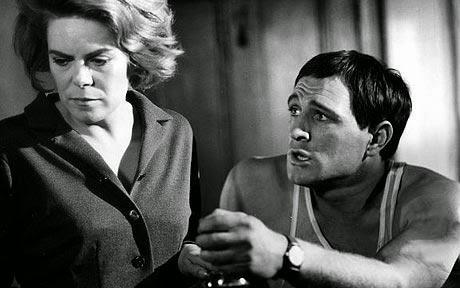 This Sporting Life (1963) marks the apex of the British New Wave. Lindsay Anderson transcends the dour grubbiness associated with that movement, showing elements of the wild auteur behind If... (1969). Strikingly directed and grimly powerful, Life's an undisputed classic.
This Sporting Life (1963) marks the apex of the British New Wave. Lindsay Anderson transcends the dour grubbiness associated with that movement, showing elements of the wild auteur behind If... (1969). Strikingly directed and grimly powerful, Life's an undisputed classic.Frank Machin (Richard Harris) works in a Wakefield mine, playing rugby in his spare time. His rough playing style earns the notice of Gerald Weaver (Alan Bladel), who hires him as a loose forward for his professional rugby team. Frank's success backfires: he alienates his friends, while his boorish behavior annoys respectable society. He pursues landlady Margaret Hammond (Rachel Roberts), whose husband died an industrial accident. The two pursue a sexual relationship, but Margaret can't reciprocate Frank's affection.
The "kitchen sink" drama was played out by 1963, soon replaced by the anarchy of Richard Lester and Swinging London. Fittingly, This Sporting Life encapsulates the cliches beloved of Tony Richardson etc. Frank's rags-to-riches drama recalls Room at the Top; his inarticulate, misogynist rage channels Look Back in Anger; provincial accents and industrial slagheaps pervade every scene. Anderson and novelist David Storey invest these shopworn tropes with such power that Life transcends everything come before.
Anderson's direction one-ups New Wave aesthetics. We're used to grim factory towns but the nuclear plant looming over a football field is far more unsettling. Anderson's narrative flits jarringly between disconnected memories: flashbacks, dreams, even hallucinations under laughing gas. This gives Life an unsteady, hectic rhythm accentuating its violence. Anderson indulges in Expressionist flourishes like a rugby match, silent except for breathing and game sounds, or Frank squishing a spider in extreme close-up. Few kitchen sink films are so aesthetically striking.
 With his brute physique and inarticulateness, Frank more resembles American loners like Stanley Kowalski or Hud Bannion than Jimmy Porter. He's tough but self-conscious, relishing his arriviste status until realizing nobody's impressed. He's manipulated by those richer, cleverer than he: Weaver exploits his skill; Weaver's wife (Vanda Godsell) tries seducing him; even his friendly mentor (William Hartnell) has sexual designs. Margaret attracts him by being utterly disinterested. Frank can't see that Margaret's still mourning her late husband, and resents being his "slut."
With his brute physique and inarticulateness, Frank more resembles American loners like Stanley Kowalski or Hud Bannion than Jimmy Porter. He's tough but self-conscious, relishing his arriviste status until realizing nobody's impressed. He's manipulated by those richer, cleverer than he: Weaver exploits his skill; Weaver's wife (Vanda Godsell) tries seducing him; even his friendly mentor (William Hartnell) has sexual designs. Margaret attracts him by being utterly disinterested. Frank can't see that Margaret's still mourning her late husband, and resents being his "slut."Richard Harris gives a flawless performance. His physicality and coarseness channels Marlon Brando (he even gets a "Stella!" moment), but Harris makes Frank his own, unique character. This "ape on the football field" projects a violent swagger, punctured by universal contempt and his own self-doubt. Ultimately Frank knows he's worthless when not scrumming in the mud, incapable of generating respect even from Margaret. Often stiff or hammy, Harris never again found such a perfect role.
Rachel Roberts (Picnic at Hanging Rock) manages a neat mixture of vulnerability and unshakable pride. Alan Bladel (The Day of the Jackal) and Vanda Godsell are appropriately cold, without descending to overt villainy. William Hartnell's role is underwritten, but conveys an unsettling attraction towards Frank. Colin Blakely (A Man for All Seasons), Leonard Rossiter (Billy Liar) and Arthur Lowe (The Ruling Class) fill supporting roles. Sharp eyes can spot Glenda Jackson and Edward Fox in bit parts.
This Sporting Life represents its genre's definitive statement: brilliantly directed, perfectly acted, relentlessly devastating. After this, any further grime-and-smokestack dramas would seem redundant.

